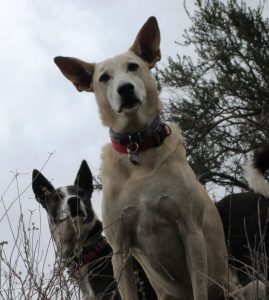
In the right combination, two dogs together are great for social interaction, boosting confidence, play, and social learning © Susan Nilson
There comes a time in many dog owner’s lives where the thought is sprung…. ‘I wonder if Fido would like a friend?’ Inextricably bound with the idea are feelings of excitement, guilt, worry because there are so many aspects to consider if you’re going to go through this whole doggy journey twice over! Let’s take a look at some of those.
Who are you doing this thing for?
Question this first. You love dogs, I love dogs, we all love dogs & that’s great but think seriously, yes most of us could have a house full but it’s not practically possible and it may not be practically possible to even have two as much as we’d really, really want to.
We have to consider really seriously lots of aspects, other people in our household – actually ask them! It’s amazing how many people don’t have a sit down conversation about it and then the resulting dog suffers the consequences. Most importantly what about your other dog (and other pets) how do you think they will cope? You know your existing dog best. How do they get on with other dogs now? Do they cope emotionally with new visitors to the home and outdoors? Are they anxious, well socialized, do they like their own space? Consider really hard and visualize how you really think your existing dog will cope with another in the home.
Common and inappropriate reasons to have a second dog
- To cure behavioral or training issues with the first
- To entertain the first dog when left alone
- To occupy the first dog
- To make an existing dog less anxious
- To make up for deficits to first dog has
- When the existing dog is reaching end of life
Can you cope?
Believe me, two dogs can be more difficult to manage than one. Yes I will agree that two can seamlessly integrate and adapt and that is great but can you cope with possibly adapting for different sleeping, living, eating and walking arrangements? Can you cope if there is the need for adjustments to be made to behavioral issues when both are integrating? Can you make environmental modifications to living spaces and do you have the space to accommodate two dogs? Extra time may need to be found to assist both dogs for example if they need to be walked separately initially. I would always suggest to owners of multiple dogs that they do not fall into the trap of viewing their dogs as ‘a whole’, always view each independently as a separate being and each with their own little quirks and traits.
The great positives of two dogs
Personally I love having two dogs together as long as it’s the right circumstances for all. Two dogs together are great for social interaction and building interactional skills, boosting confidence, social learning all though this can be a negative sometimes in the case of socially facilited behaviour such as inappropriate barking! When you have two dogs together it is wonderful to see the two interact and play in a way that you as an owner cannot quite replicate, they provide companionship and their own form of enrichment.
Ideal age gap
This is a provocative issue. Personally I think it is rather unfair to choose a wild and bouncy puppy who is full of vigor and naturally wants to chew and explore when your existing dog is nearing the end of their life and desires calm and peaceful days. Choosing a pup whilst your dog is still relatively young is more beneficial to both parties and ensures that you do not cause stress and anxiety to your existing dog.
Puppy, older dog?
This very much depends upon your existing dog. How old is your dog, how does she get on with others, are there any behavioral issues with other dogs etc? Think carefully. Some dogs find the boisterous and unpredictable nature of puppies particularly challenging and are much better suited with older dogs. You might think about re-homing a dog, take your dog to a reputable re-homing center and see how your dog and a proposed new friend get along.
Introducing
When you have your new friend, introduce on neutral ground or in a large and open space. What you do not want is to meet and greet in a close, confined space where anxiety is heightened and sparks may fly. Keep your involvement to a minimum but stay close at hand. Also ensure that you have no resources to compete over (toys, food, games etc.) and that includes yourself and your praise. Keep everything calm and relaxed and give each their own quiet space and let them settle, no forced interactions, wild excited humans or attempts to get each to play.
Keep routine consistent
Many owners worry for the existing dog and this is totally natural. Keep everything as it was for your first dog. This will help your dog because a huge change in routine will cause anxiety and it will also help you. Keep your feed schedule, walks, playtime as it was and all those little things you used to do together, they all stay as they were.
There’s no doubt that going for dog no.2 is a huge step and it requires lots of thought and you must do it for the right reasons, but two dogs can be so rewarding for all of you.
